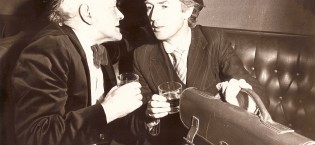Festival Adjudicator Says “To Live in Peace” a Grand Production
 “For the last ten or fifteen years the West End of London has been examining with great morbid curiosity every perversity, which they can dig up. This is apparently art. The theatre of the gutter of humanity which has taken place there horrifies me because I was under the impression that art should elevate people”, said Mr. Ray Mc Anally at Ballyshannon Drama Festival. He added that it was a great day for him to see the fundamental things, undramatic, but for great sublime reasons, in Sligo Drama Circle’s play “To Live in Peace” adapted from the Italian of Giovachine Forzano by Victor Rietti. Following his remarks, Mr. Mc Anally received a great ovation from the audience, and he congratulated Sligo Drama Circle for letting him have the experience of meeting a person as grand as the character in the play (“Don Geronimo” the Parish Priest).
“For the last ten or fifteen years the West End of London has been examining with great morbid curiosity every perversity, which they can dig up. This is apparently art. The theatre of the gutter of humanity which has taken place there horrifies me because I was under the impression that art should elevate people”, said Mr. Ray Mc Anally at Ballyshannon Drama Festival. He added that it was a great day for him to see the fundamental things, undramatic, but for great sublime reasons, in Sligo Drama Circle’s play “To Live in Peace” adapted from the Italian of Giovachine Forzano by Victor Rietti. Following his remarks, Mr. Mc Anally received a great ovation from the audience, and he congratulated Sligo Drama Circle for letting him have the experience of meeting a person as grand as the character in the play (“Don Geronimo” the Parish Priest).
Mr. Mc Anally said, “Cardinal Newman once said you cannot have sinless literature without sinful humanity. We must all agree with that. If a theatre artiste is anything at all, he is a person who interprets people to people. In examining human beings you are going to come across sin, but it depends entirely on what your experience is. A great artiste must be truthful and must not try to gloss over difficulties or present a cheap white-washed picture. He must present truth. I think the difference between a very good artiste and a great artiste is that the good artiste can be dedicated to the wrong ideals and come up with the picture which is there and which you cannot deny. He says ‘This is the way God created the Universe’. He is quite right and he draws the conclusion that is despicable. The really great artiste says ‘This is the way God created the World’ and this is also truth, and he draws the conclusion ‘isn’t it magnificent, isn’t it wonderful’, and gives it a sense of wonder and awe. Art has to be the impact of the infinite on the finite. The day we stop reaching for this outline of showing the wonderful things in life, of the fantastic destiny of the human being, the day we stop searching for that, art will be lost.
Mr. Mc Anally said it was a grand production and it was a pity after such a night in the theatre to start criticising anything at all. “To a very large extent”, said Mr. Mc Anally, “you offer a criticism to one group and one to another, based on slightly different standards. Obviously, a group entering a festival for the first time cannot be dealt with as severely as a more experienced group. I will pay this group the compliment of tackling them on a fairly high level of criticism. The fundamental point in the play is ‘being as wise as a serpent and as simple as a dove’. What we want here is utter simplicity of the priest. To get this across is quite a task. The producer had a lovely set, delightful in fact, and he used colour with a nice sense of design. He took on the entire job of getting the full requirements of this set, in limited space, and got away with it. It was a very courageous thing to do. However, in whatever convention you present a play you must stick to it. Here, there was no playing towards the audience and suddenly the producer is faced with the parish priest handling a near riot and he plays it towards the audience. It is courageous but he broke the convention he had established. Using it only once in the show led to a little spot of bother. The only alternative I think is to change the window.
“Lighting was very good. I think that if this producer had twenty extra spots and dimmers he would use them all well. Costuming I liked, being colourful and pleasant to the eye. I did not like the soldiers’ uniforms. It seems rather unfair of me to carp about this because I am quite sure they were hired, but frankly, ‘someone’s mother wasn’t using Persil’. I don’t think Napoleon would have tolerated the lack of polish. These men might have been wearing uniforms which were dead accurate but it isn’t always necessary to be accurate as long as you get a better effect from from something which may not be uniformly right. As far as I was concerned they were not quite theatrically correct, though you can be sure this was outside the producer’s control. The producer’s movements were done very well. There were one or two messy bits and I would like to see him use the stage more. He got into very slight masking problems by playing most of his movements in the centre of the stage In a small stage it is essential for him to use it more.
“Maria (Mary Mc Govern) with Agnese, were much too like the type of housekeeper Joe Tomelty writes for his priest. They should have established the uninhibited thing at the beginning. Maria had not quite enough Italian warmth. The doctor (Myles O’ Leary) was quite good. Matteo (Monica Toher) needs a little more velocity and it will be a quite good performance. Cecco and Spinose (played by Lionel Gallagher and Jimmy Gilmartin) had smallish parts and were quite good. Lorenzo (Eddie Masterson) I thought overplayed. Corporal Martiez (Eddie Fitzpatrick) played so much for comedy and the gay deceiver. In fact he is a nice, honourable, clean, good fellow. It is a comedy part but I think he played it for a slightly wrong sort of comedy. This was not helped by the French accent when it was not being used by everyone. General Miollis (Joe Mc Morrow) had a speech problem too. He was quite good. Friar (Joe Lally) definitely overplayed as did the lawyer (Joe Hayes). Cavaliere Dossi (Vivian Francis) was quite good. The acting right through the show was quite uneven. There is a lack of decision among the characters about exactly what they are doing. As it happened, the whole thing delved together in a show which was good. So much exact good was done by the producer that these faults don’t spoil the show though there are many ways in which it can be improved.
Don Geronimo (Paddy Dooney) gave a delightful performance. He was very good in comedy and when he got his quiet moments, when he had to build up sincerity, he was true right to the bottom of his soul. I was very pleased. Internally in the show he is called upon to do a lot of things, emotionally and intellectually, which in a play like this are deceptively numerous. This man displayed a versatility of soul internally which I thought was wonderful. There was a sense of great understanding, comedy and human sanctity. I hope you will forgive me for complaining a little in that he put in a little too much fussiness. I would like to see him easing up on this. This player has quality, tremendous depth, a really gorgeous sense of timing and a lovely sense of humour, as well as having the trouper instinct.
I have been quite sever in terms of acting and production because this production deserves to be criticised on as high a level as possible. There are novice shows which I will not attack on a high level, but this is a ‘big boy’ and should be able to take a few words from me.” The producer was Joe Flood and others taking part were – Una Lappin, Ruth Crampton, Dolores Mac Grory, Mary Lu Raftery, Aubrey Lally, And Joe Meehan.
from The Sligo Champion, April 22nd, 1961
Tags: Festivals, Giovacchino Forzano, History, Press Reports, Productions, Ray Mc Anally, Reviews








